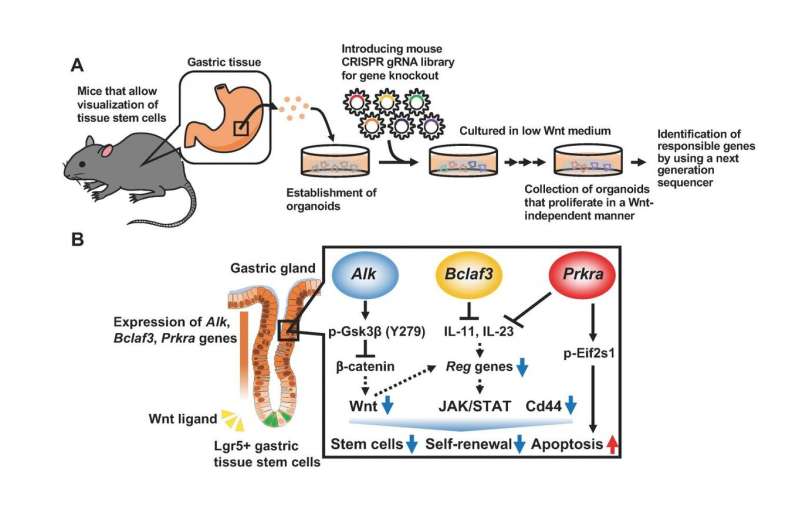

The human body consists of about 60 trillion cells that are renewed day by day to maintain homeostasis of body tissues. In particular, cells of the digestive tract are renewed completely within several weeks thanks to vigorous proliferation where tissue stem cells of every tissue play critical roles in supplying those cells. Tissue stem cells play essential roles in various phenomena such as histogenesis and recovery from damage by producing differentiated cells while dividing. They do this by producing identical cells (self-renewal) or by differentiating into other types of cells. The research team led by Profs. Murakami and Barker of the Cancer Research Institute, Kanazawa University revealed the presence of gastric tissue stem cells expressing the Lgr5 gene, a tissue stem cell marker at the gastric gland base in the gastric tissue, the stemness of which could be suppressed by Wnt signaling (Leushacke M. et al., Nat. Cell Biol., 2017). However, due to the technical difficulty of further detailed in vivo verification, most of the molecular mechanisms related to tissue stem cells regulated by Wnt signaling remained a mystery.
The research team investigated the intracellular molecular mechanisms for Wnt signaling-dependent regulation of proliferation and self-renewal of gastric tissue stem cells by using organoids established from mice. These enabled visualization of Lgr5+ gastric tissue stem cells. Further, screening using Genome-Scale CRISPR Knock-Out (GeCKO), which can arbitrarily produce loss-of-function of various genes, allowed the elucidation of molecular mechanisms regulating the Wnt signaling-dependence of gastric tissue stem cells. The team revealed that loss-of-function of Alk, Bclaf3 and Prkra genes induced Wnt signaling-independent proliferation of the organoids. Because these genes are expressed in differentiated cells of mouse gastric tissues but not in stem cells, the team postulated that these genes might negatively regulate the stemness of tissue cells. Further analyses have revealed that Alk suppresses Wnt signaling by phosphorylating Gsk3β, one of the regulatory factors of Wnt signaling. Further, Bclaf3 and Prkra regulate the expression of Reg family genes, which are essential for proliferation of gastric tissue stem cells, by inhibiting expression of epithelial interleukins 11 and 23. From these results, Alk, Bclaf3 and Prkra have been identified as the genes that determine the stemness of gastric tissue stem cells.
Source: Read Full Article